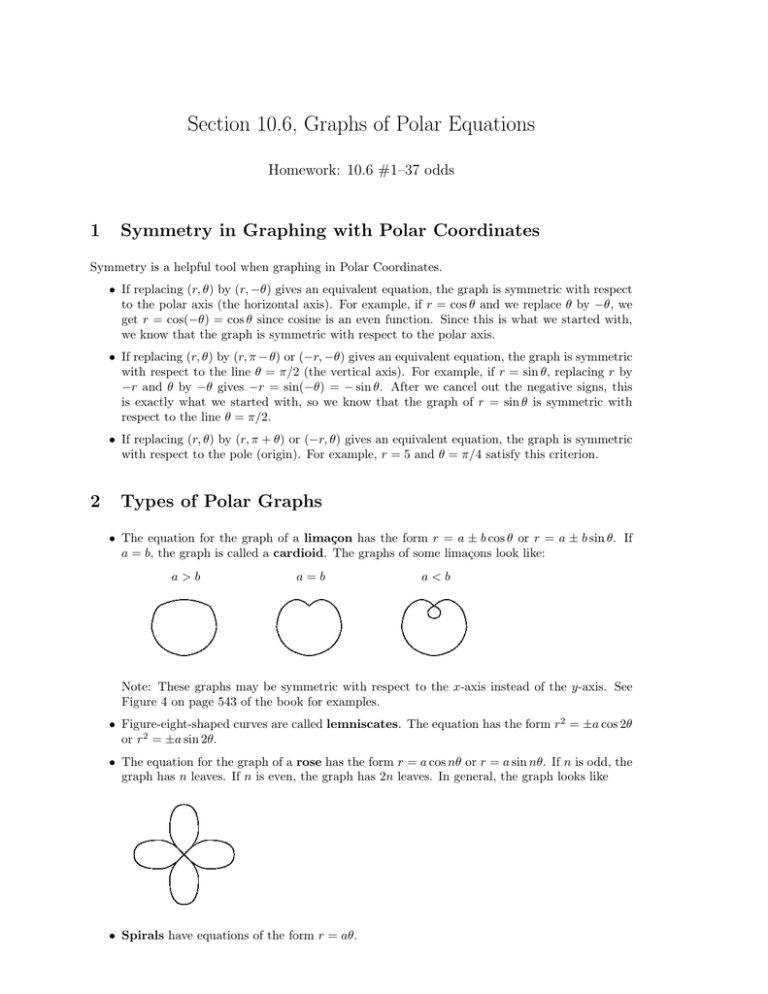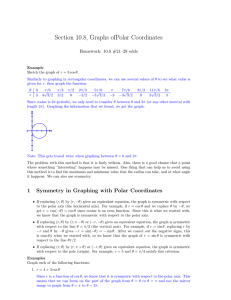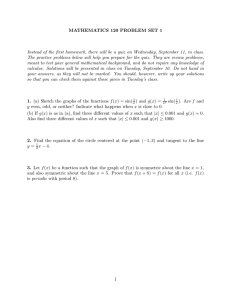Section 10.6, Graphs of Polar Equations 1 Homework: 10.6 #1–37 odds
advertisement

Section 10.6, Graphs of Polar Equations Homework: 10.6 #1–37 odds 1 Symmetry in Graphing with Polar Coordinates Symmetry is a helpful tool when graphing in Polar Coordinates. • If replacing (r, θ) by (r, −θ) gives an equivalent equation, the graph is symmetric with respect to the polar axis (the horizontal axis). For example, if r = cos θ and we replace θ by −θ, we get r = cos(−θ) = cos θ since cosine is an even function. Since this is what we started with, we know that the graph is symmetric with respect to the polar axis. • If replacing (r, θ) by (r, π − θ) or (−r, −θ) gives an equivalent equation, the graph is symmetric with respect to the line θ = π/2 (the vertical axis). For example, if r = sin θ, replacing r by −r and θ by −θ gives −r = sin(−θ) = − sin θ. After we cancel out the negative signs, this is exactly what we started with, so we know that the graph of r = sin θ is symmetric with respect to the line θ = π/2. • If replacing (r, θ) by (r, π + θ) or (−r, θ) gives an equivalent equation, the graph is symmetric with respect to the pole (origin). For example, r = 5 and θ = π/4 satisfy this criterion. 2 Types of Polar Graphs • The equation for the graph of a limaçon has the form r = a ± b cos θ or r = a ± b sin θ. If a = b, the graph is called a cardioid. The graphs of some limaçons look like: a>b a=b a<b Note: These graphs may be symmetric with respect to the x-axis instead of the y-axis. See Figure 4 on page 543 of the book for examples. • Figure-eight-shaped curves are called lemniscates. The equation has the form r2 = ±a cos 2θ or r2 = ±a sin 2θ. • The equation for the graph of a rose has the form r = a cos nθ or r = a sin nθ. If n is odd, the graph has n leaves. If n is even, the graph has 2n leaves. In general, the graph looks like • Spirals have equations of the form r = aθ. Examples Sketch the graph of each of the following functions. Identify what kind of graph the equation represents, as well as what kind of symmetry exists. 1. r = 4 sin θ This is a limaçon that is symmetric about the vertical axis. Specifically, it is a circle of radius 2 centered at the point (0, 2). The graph looks like: 6 '$ &% 2. r2 = −16 cos 2θ This is a lemniscate that is symmetric with respect to the horizontal axis. The graph looks like: 6 - 3. r = 4 − 3 sin θ This is the graph of a limaçon that is symmetric with respect to the vertical axis. The graph looks like: 4. r = 2θ This is the graph of a spiral. There is no symmetry. The graph was sketched in class. √ √ 5. r = 2 − 2 sin θ This is the graph of a cardioid that is symmetric with respect to the vertical axis. 6. r = 4 cos 2θ This is the graph of a rose with 4 petals. It is symmetric with respect to the horizontal axis. The graph looks like:





